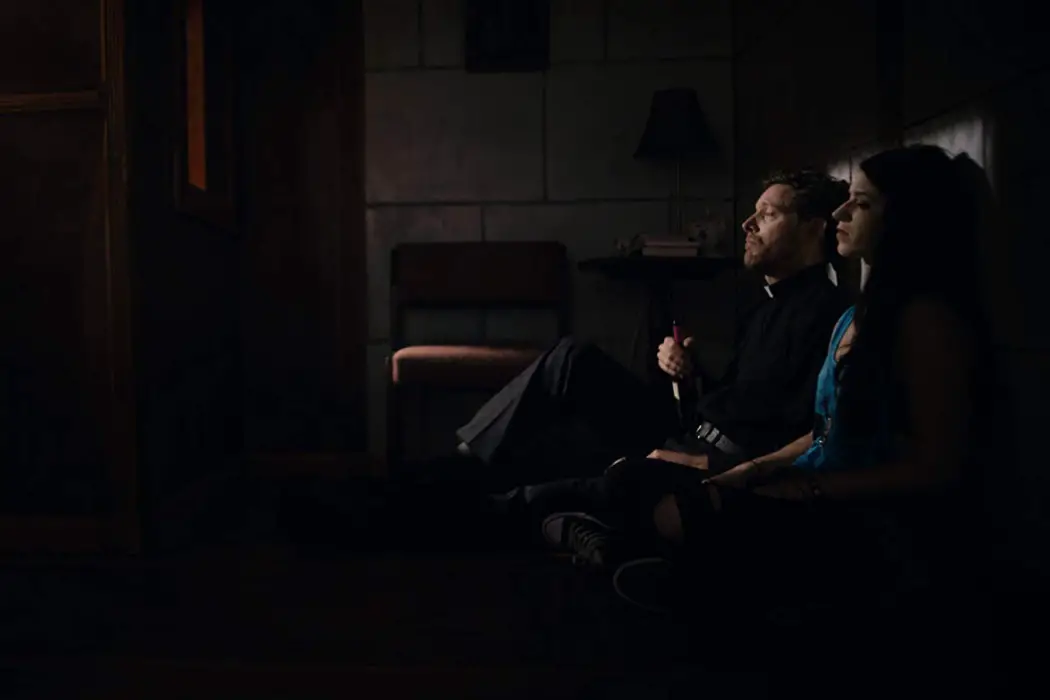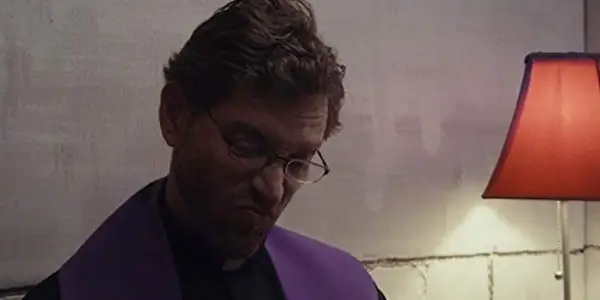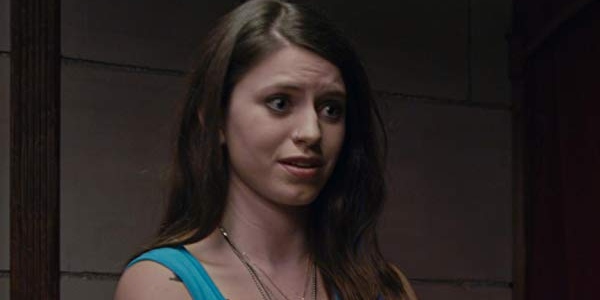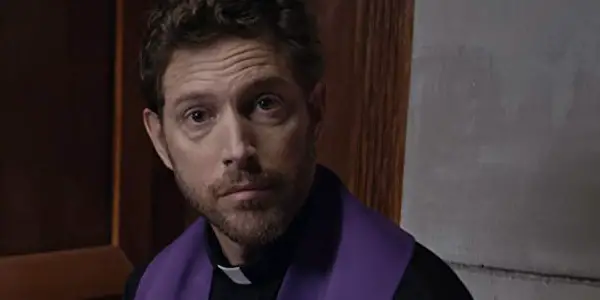SURVIVING CONFESSION: Faith-Based Comedy Confesses The Cruciality Of Doubt

Andrew Stover is a film critic/writer from the Chicagoland. His…
Matthew Tibbenham’s character study of a discontented priest does not feature any barbed wire, levitation or a glass of Drano. Instead, Surviving Confession spotlights a censorious and exhausted priest, simply coasting through the motions and upholding the word of the lord to gratify a bunch of thankless sinners. Tailored in the customary non-liturgical clothing and confined to a strait box, Father Morris (Clayton Nemrow) is anything but refined, at least behind the cloak of God and when he’s not appeasing sinners of their sins.
To understand the seemingly eternal job of a preacher and what a confession entails, Father Morris expounds it bluntly: “In theory, it is a beautiful act of contrition and redemption. In reality, I am trapped inside this tiny box for hours, sitting on a hard wooden chair, listening to the inane regurgitations of rote sins ’til my body’s numb and my mind’s mush.” Father Morris was once charged with charisma and devotion for the spiritual prowess he would wield by dedicating his life to God. But as the days turned into months, and the months turned into years, tedium gradually overwhelmed his spiritual drive to aid peccable believers.
Father Morris isn’t bored, but the amount of time spent in the compacted confession room — listening to trivial sins and halfhearted divulgences — has forced him to implement prolific self-reflection. “Confess, confess, confess, and they’re back again the next week. And the week after that. And the week after that. And the week after that ’til, you start to wonder, did they even mean it?” Everyone sins, but whether they feel sincere remorse for their wrongdoings should be addressed. A priest knows the prayers and sayings to reprieve the sins, but the sinners may not genuinely care they’ve done wrong, they just crave a ticket to Heaven. Father Morris begins seeing this more clearly day after day, and that thrusts him to envisage what it must be like to be outside the ministry, living life without restrictions.
When an intractable and offbeat teenager named Amber (played House of Lies’ Jessica Lynn Parsons) infiltrates the confession room, her immeasurable blitheness and frankness causes Father Morris to lose a sense of direction. Mischief befalls, unholy truths are unveiled and a crisis unfolds.
“It’s not boredom, it’s hate. I hate it.”
Sounds like an awfully plain-spoken and quite harsh statement from a priest, but Father Morris’ thoughts could never appear more comprehensible. Have you ever confessed your sins? Beyond the confession room, and beyond the walls of a church, even, have you apologized or publicly revealed a misdeed in some fashion because the guilt of concealing it plagues your mind? Sometimes you would do anything to absolve the guilt, and an authority figure, like a priest (and embodying one of God’s most pliable followers), could simply wash away the sorrow and you’re scot-free. Well, believe it or not (but I’m sure you’ll agree), there are people who will do wrong, and continue to do so, as long as an authoritative figure can forgive their iniquity. Some people just want validation that they will remain in God’s good graces.

For Father Morris, it’s getting harder and harder to liberate sinners, when the sinners are putting on a mask radiating their devotion to their faith and God, but underlying motives say otherwise. And when it’s the same people returning week after week, it’s even more challenging to cognize their repentance as authentic. The film opens to a placid title sequence, welcoming viewers in with solemn church music, during in which several shots provide details of church artifacts while also helping to capture the poky setting. The music simmers down, and Father Morris positions himself in a chair. The composition of the items on the small table beside him, and where Father Morris resides, sketches a very meticulous arrangement, uniform yet redundant. The entirety of the picture takes place in this restricted confession room, not necessarily the confession box. Some people like confessing their sins anonymously, but for the sake of filmmaking, the setting takes place in a room where the priest can sit face-to-face with the sinner — although the film tries to persuade you this type of confession is common. Unfortunately, I wouldn’t know (God bless my soul).
In the opening five minutes, Tibbenham establishes the humor by having Father Morris break the fourth wall. Immediately when Father Morris sits down, he starts describing the monotony of listening to people confess, especially when they speak about piffling matters, and they don’t deeply weather remorse and learn from their actions. Once you look beyond the godly vest and godly guise of Father Morris, you’ll find an everyday man, still committed to his religion, but growing increasingly more frustrated with the insincerity of everything he hears. One frequent sinner is a businessman named Rupert (Kevin Ging), and Father Morris describes him as “well-respected by those who know him least”, so obviously, Rupert is prone to a lot of sin. Most notably, Rupert’s tempted by the sin of adultery, and he cheats on his wife, Mary (Jayne Marin), who just so happens to stop by to confess her sins to Father Morris as well. Rupert confesses to the sin of speeding, lying and not giving his spare change to a homeless man, but still refuses to admit he’s given in to carnal lust with another woman.
Father Morris hates this man. Commonly, you would think a priest would not judge or condemn a person for their actions because forgiveness is a power they initially employ. But preachers are only human, and our inner thoughts can very well overpower our nonjudgemental propensities. This is more vividly seen when another man, who’s dying, comes in to confess his numerous sins (which are played out so shockingly, chiefly to help delineate the insincerity of some people who come in to confess their sins, when they don’t totally believe in the faith or even God). In reality, our emotions can render us selfish, hostile or apathetic. Father Morris spent so much time with imperfect humans, he himself is a victim to desire. He simply didn’t realize this fact until Amber abruptly rushed in, merely to tell Father Morris she killed a man — a homeless man in fact, with the homeless man’s own knife. Father Morris doesn’t buy it.

From the moment Amber arrives on-screen, a spirited Jessica Lynn Parsons supplies the hilarity and dredges up Father Morris’ romantic feelings he tries so hard to disguise with prayer. Parsons plays the character with brimming brio and shamelessness, but kind of propelling brassy humor that occasionally feels a bit tacked on. In regard to Father Morris and his flowery vocabulary/critical remarks, Clayton Nemrow sort of inherits this likability. Father Morris is slightly haughty, but his criticism is amusing. Nemrow portrays an unusual preacher, sometimes overbearing and bitter, but Amber promptly criticizes him back. Nobody is free from fault. For even contemplating leaving the ministry and (even mentally) chasing a married woman, that’s a sordid desire in itself. Surviving Confession doesn’t urge you to confess, but it cunningly indicates how even the most evidently holy individuals are thinking the unforgivable, it seems like. The fact that Father Morris finds himself yearning for a life outside the chapel walls says a lot about how susceptible we all are to aspiration.
“I have doubts, and that father is my sin.”
Doubt, it’s the most infuriating, decidedly applicable feeling to endure. Whether it be self-doubt, doubt in the world or, in this instance, doubt in one’s faith, it keeps us sharp. The quote above was said by no one other than Father Whelan (Jerry Bornstein), another priest in the movie who questions his devotion to this god-oriented life. How much he gave to God, what he didn’t get back and what he never had the chance to attain. Father Whelan asks Father Morris whether being a preacher was worth it, and a hesitant Father Morris responds “Of course, immeasurably.” That, my friend, is a lie. Lying, it’s intrinsic at this point in life. Either a white lie or an earth-shattering lie, it’s fair to say we all told a lie during one point in our lives (possibly even more).

Throughout the movie, Amber masks her truth with lewd, stereotypical humor, while Father Morris tries to get rid of her because she’s pushing for things she doesn’t need to know. Situated in one, tiny room, Amber and Father Morris go back-and-forth, trying to probe the truth out of one another. It’s not the most interesting set-up, and the back-and-forth dialogue heavily relies on the reverse-angle shot far too much, but their performances are entertaining. The dialogue can be stilted, particularly the humor, but the purposeful angle is wonderfully direct and crude. Amber and Father Morris have doubts about love and life, while also drowning in uncertainty, and I like to think Surviving Confession is all about doubt.
I do not believe doubt is ever a sin. Doubt in one’s faith will either make you believe even more in your faith, or it’ll force you to find new meaning elsewhere. Doubt in one’s actions and career choices is regularly evaluated by every person, to some extent. Preachers may serve God, but even preachers can’t escape the emotions everyday sinners encounter. I do, however, have disbelief about whether or not Tibbenham made the right decisions in the fiery conclusion. Secrets are revealed and feelings are made public, but the fashion in which the ending unfolds can appear overtly melodramatic. Everything collapses, metaphorically speaking, but everything kind of falls apart too briskly, and gets cleaned up too nicely. The melodrama is heavy, but the ending wrestles with unveilings that feel almost too theatrical and cursory.
Surviving Confession Prospers On Its Well-Rounded Cast
The small-scale environment, the deliberate discussion of faith and desire, the rigorous attention to smaller details and the composition of the objects, makes a case that Surviving Confession might have been a play, captured by modest camerawork. But Matthew Tibbenham’s Surviving Confession is very much a lively indie taking place in a lifelessly cramped setting, while bluntly speaking some commendable verities of being human.
Dubiety and self-scrutiny are almost guaranteed in one’s depressingly short life, including God-serving priests. Although the tonal balance of showy humor and inflated melodrama is not always the most effective arrangement, the small cast all bring something distinctly different to the table, personality wise. Mainly Clayton Nemrow and Jessica Lynn Parsons, who keep this not-so-holy conversation of human impulse still immensely spellbinding.
What is your favorite faith-based movie? Let us know in the comments!
Watch Surviving Confession
Does content like this matter to you?
Become a Member and support film journalism. Unlock access to all of Film Inquiry`s great articles. Join a community of like-minded readers who are passionate about cinema - get access to our private members Network, give back to independent filmmakers, and more.
Andrew Stover is a film critic/writer from the Chicagoland. His film & TV reviews can be found on Film Inquiry & Film Threat.













